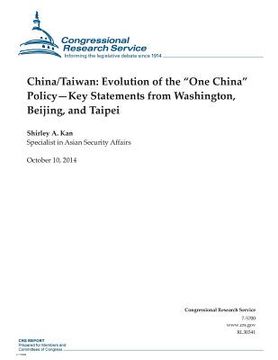China/Taiwan: Evolution of the "One China" Policy-Key Statements from Washington, Beijing, and Taipei (en Inglés)
Reseña del libro "China/Taiwan: Evolution of the "One China" Policy-Key Statements from Washington, Beijing, and Taipei (en Inglés)"
Despite broadly consistent statements, the U.S. "one China" policy concerning Taiwan remains somewhat ambiguous and subject to different interpretations. Apart from questions about what the policy entails, issues have arisen about whether U.S. Presidents have stated clear positions and have changed or should change policy, affecting U.S. interests in security and democracy. This CRS Report, updated through the 113th Congress, analyzes the "one China" policy since U.S. Presidents began in 1971 to reach understandings with the People's Republic of China (PRC). Taiwan calls itself the Republic of China (ROC) and does not recognize the PRC. There are three sets of issues: sovereignty over Taiwan; PRC use of force or coercion against Taiwan; and cross-strait dialogue. The United States recognized the ROC until the end of 1978 and has maintained non-diplomatic engagement with Taiwan after recognition of the PRC in 1979. The State Department claims an "unofficial" relationship with Taiwan. The United States did not explicitly state Taiwan's status in the U.S.-PRC Joint Communiques of 1972, 1979, and 1982. The United States "acknowledged" the "one China" position of both sides of the Taiwan Strait. Since 1971, U.S. Presidents-both secretly and publicly-have articulated a "one China" policy in understandings with the PRC. Congressional oversight has watched for any new agreements and any shift in the U.S. stance closer to that of Beijing's "one China" principle-on questions of sovereignty, arms sales, or dialogue. Not recognizing the PRC's claim over Taiwan or Taiwan as a sovereign state, U.S. policy has considered Taiwan's status as unsettled. With added conditions, U.S. policy leaves the Taiwan question to be resolved by the people on both sides of the strait: a "peaceful resolution" with the assent of Taiwan's people and without unilateral changes. In short, U.S. policy focuses on the process of resolution of the Taiwan question, not any set outcome. The Taiwan Relations Act (TRA) of 1979, P.L. 96-8, has governed U.S. policy in the absence of a diplomatic relationship or a defense treaty. The TRA stipulates the expectation that the future of Taiwan "will be determined" by peaceful means. The TRA specifies that it is U.S. policy, among the stipulations: to consider any non-peaceful means to determine Taiwan's future "a threat" to the peace and security of the Western Pacific and of "grave concern" to the United States; "to provide Taiwan with arms of a defensive character;" and "to maintain the capacity of the United States to resist any resort to force or other forms of coercion" jeopardizing the security, or social or economic system of Taiwan's people. The TRA provides a congressional role in determining security assistance "necessary to enable Taiwan to maintain a sufficient self-defense capability." President Reagan also offered "Six Assurances" to Taipei in 1982, partly to continue arms sales. Policy makers have continued to face unresolved issues, while the political and strategic context of the policy has changed dramatically since the 1970s. Since the early 1990s, U.S. interests in the military balance as well as Taiwan's security and democracy have been challenged by the PRC's military buildup (particularly in missiles) and potential coercion, moves perceived by Beijing for Taiwan's de jure independence under the Democratic Progressive Party's (DPP's) president (2000-2008), and resistance in Taiwan by the Kuomintang (KMT) party to investing in self-defense. After the KMT's Ma Ying-jeou became President in May 2008, Taipei and Beijing reduced tension and resumed talks-beyond seeking detente. With President Obama since 2009, a rhetorical convergence emerged about "peaceful development" of cross-strait ties.

